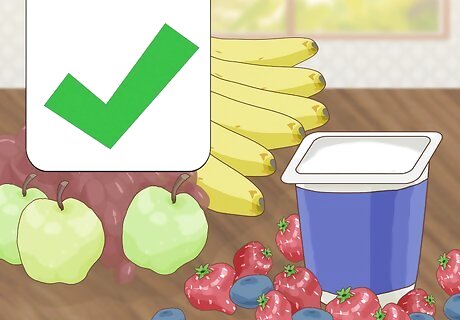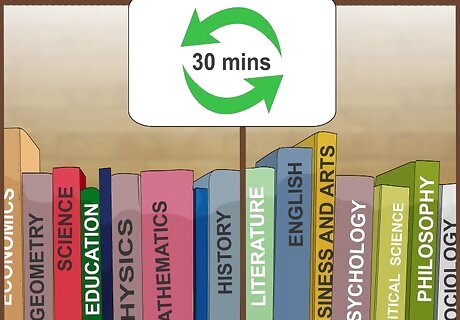
views
Keeping a Schedule

Wake up at the same time each day. Doing this allows you to set your body’s clock and create discipline. Humans are creatures of habit, so getting up and going to sleep at the same times each day normalizes your routine. Additionally, this habit improves the quality of sleep over time, so you’ll wake feeling more rested and alert. Depending on your age, you'll need to get between six and ten hours of sleep each night. Ask your doctor how much sleep you should be getting to fully rejuvenate your mind and body. Stop hitting snooze. Each time you do, you'll be interfering with your body's natural sleep cycle and making it more difficult to wake up.

Avoid jumping straight into work. Don’t get right out of bed and start an assignment. Instead, give your brain time to wake up. Take a shower, go for a walk, or do yoga. Whatever you want to do to get your blood flowing, and make you feel more awake and alert once you start on your assignments.

Time yourself. Set repeating alarms on your cell phone, and change subjects or take breaks at the same times each day. Again, this will get you in the habit of staying on task. If there’s a subject you’re not very fond of, reminding yourself that you only need to study or work on an assignment in that subject for a specific length of time can make you feel more positive about getting through your tasks.

Make to do lists. You can organize these in whatever way works for you. For instance, create a list of assignments you need to complete each day or for each subject. You can write these down or add them in a calendar, Word document, or other form of digital file. Whatever form of to do list you choose, make sure to periodically review the items, and mark off those you’ve completed.

Exercise every day. Exercise releases endorphins, boosts energy, and helps you concentrate. Even if it’s something as simple as taking the dog for a walk in the morning or standing up and doing some stretches, exercise can help you stay on task and get your work done. You should do a few stretches or at least walk around a bit during every break. If you're sitting for long periods of time, you need to stand up to allow blood to flow through your body and improve energy. Move your shoulders forward and back to remove tension that can build up there. Stretch hands and arms to avoid a repetitive motion injury, especially if you've been typing for several hours.
Staying Fresh

Avoid working on a full stomach. This can make you sluggish and unable to focus. Eat light, healthy meals with lots of protein before getting to work. This will give you the energy you need to complete the tasks without weighing you down. Eat small snacks at various points in your lessons to boost energy periodically rather than consuming large meals. Peppermint improves concentration. If you find your energy flagging or you’re getting distracted, grab a peppermint. Eat fruits to get a natural sugar boost. Apples are a great option to increase energy and concentration naturally. String cheese, Greek yogurt, and other low-fat dairy items help to boost energy without creating excessive fullness.

Switch between subjects more frequently. If you notice you’re getting more easily distracted or working more slowly, you may want to shorten the period of time you spend working on each subject. This doesn’t work for every student, but try switching more often, every half hour instead a full hour, and see if helps you stay on task.

Reward yourself for completed assignments. Play a game of "Let’s Make a Deal." For example, you can tell yourself, "After I finish math, I can go outside with my dog for 10 minutes." Make sure that your parent or tutor approves of these rewards.

Take regular breaks. Don’t force yourself to keep working without breaks for more than an hour or two. If you’re “in the zone” and don’t want to stop, keep going, but if you’re dragging, let yourself stand up and walk around for a few minutes every hour. This breaks up the day and re-energizes you to get back to work. Taking a twenty minute nap midway through the day can increase your productivity in the afternoon, so you may want to consider laying down for just a few minutes. Standing up, going for a walk, or stretching will get the blood flowing, improve circulation, and make you feel more alert.

Take on project-based learning. If you have a parent or tutor supervising your curriculum, ask them to help you come up with ways to keep things interesting with more project-based learning. That might mean taking a field trip or going to see a performance of play. You should also remember to be flexible. If you get really interested in one subject, keep going! If you just can’t concentrate on a task, switch it up.
Having Fun with School Work

Engage in other activities. If it's possible, play an organized sport, take music lessons, or join a book club. The discipline of these group activities will help you get motivated and stay focused. Because you have other places to be, you’ll have a reason to get your work done within a specific timeframe.

Take advantage of what's near you. School doesn't have to be limited to your desk or the kitchen table. Find out what’s happening at local museums and zoos. Check out what shows your community theater is performing, or keep it simple and take a trip to the local park to identify plant types. You'll be surprised how much is relevant to what you're learning, and how seeing things for yourself can make once-boring schoolwork exciting again.

Change up your study location. With the right mindset, homeschooling can be the best way to receive an education. One of the most unique things about homeschool education is that you don't necessarily need to do it at home. Visit your local public library or spend some time at a coffee shop. A change of scenery can be an easy way to reset your focus.

Find a way to do what you're learning about. If you're studying a topic, don't just read about it in a book. Students in schools have labs and other experiential learning assignments, and you should too. Find a way to do at-home science projects, put on the play you're reading with family and friends, or ask your local vet if you can shadow them for a day or week to learn about animals. Get creative and have fun learning.

Dig deeper when you're interested in a subject. If you find a topic that really catches your interest, see if there are books in the library or a YouTube video that tells you more about it. One of the best things about homeschooling is the flexibility, so take advantage of it and have fun.


















Comments
0 comment